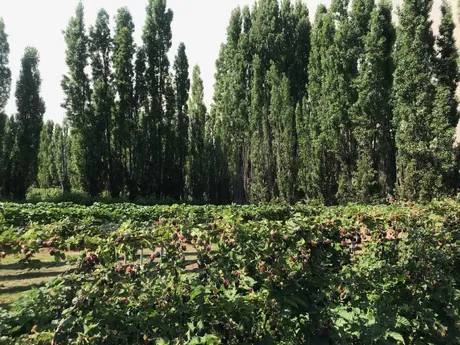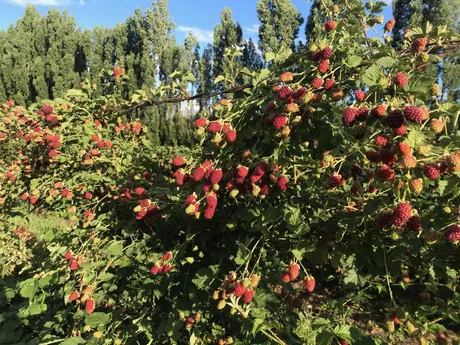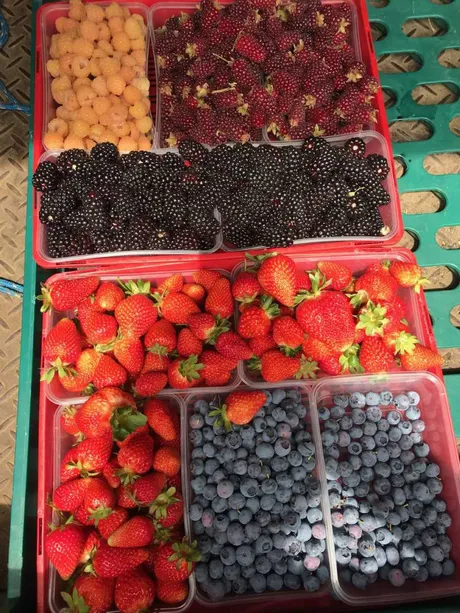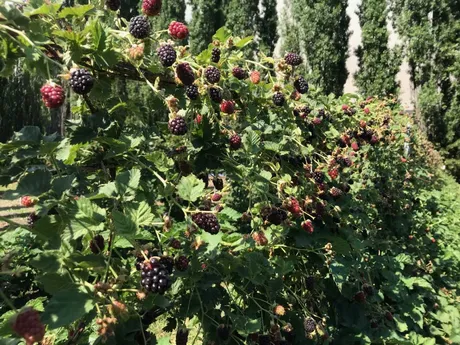Tourists are getting behind Tasmania's agriculture like never before, according to one of Australia's leading berry producers.
Westerway Raspberry Farm, in the Derwent Valley, has an agritourism business attached to the farm, which includes fresh farm gate sales as well as farm visits and pick your own berries. Owner Richard Clark has seen 30 per cent growth year on year, as a result of the rise in visitation.
"Tourists are really discovering Tasmania, especially interstate and international tourists," Mr Clark said. "So, it was only about four or five years ago when Tasmania was celebrating 1 million tourists and last year, we cracked 1.5 million. Our farm also buys back products from the customers we supply with mechanically harvested processing berries who makes interesting products such as ciders, juices, jams, vinegars and ice creams - and then we offer them at the farm gate. We are looking at another jump in our farm gate sales. We have a lot of interesting fruits that people can pick themselves in December and January and sort of have a day out on the way up to the Mt Field National Park or salmon ponds. It's a really undiscovered part of Tasmania, the Derwent Valley, but it is starting to get a lot of attention, which is great."

He says another trend is patching the disconnect that has occurred between the city and rural areas, because now many people are seeking authentic experiences and seeing the paddock to plate supply chain.
"Once upon a time everyone in a city had an uncle, or a grandmother, or a cousin who had a farm, and they probably sent their kids out for a few weeks during summer holidays to spend time doing a bit of farm work," Mr Clark said. "But these days there's a bit of a disconnect between the city and farms, and I think in Tasmania we are lucky in that you can drive 45 minutes from Hobart in about any direction and you are in prime agricultural land. You can go out and pick your own fruit, you can see where it is grown, and talk to a farmer."

While Westerway Raspberry Farm is one of the largest berry producers in Australia, it is still a medium-sized farm, with a family-centred focus. As well as raspberries, the family grows strawberries, blackcurrants, blackberries, blueberry and silvanberries. The shop is also the packing shed which overlooks the berry fields, so visitors can watch the fruit being packed and see the production process unfold. Mr Clark is excited about this season at the farm, despite the mid-year weather conditions.
"It's been quite a cold spring, so our raspberries have been a bit slow, he said. "It's been a bit wet and damp. But we started to get a bit of sun in early summer, and a bit of a breeze which dried things out a little. For our blackcurrants, we are the last commercial growers of blackcurrants in the country and they need 800 winter chilling hours a year in order for them to flower really well - this year the winter was pretty mild. So, we didn't get a huge flowering and fruit set. But more broadly our strawberries are looking wonderful, our raspberries are looking great, the blackberries have never looked better - we have some nice flowering on the boysenberries and tayberries."

Westerway Raspberry Farm does not just grow the standard varieties of berries, with gold and black colours also attracting the interest from customers - albeit not in commercial quantities.
"There's golden raspberries and josterberries," Mr Clark said. "Golden raspberries are a bit like an Albino raspberry. It is the same as a red raspberry, but it is missing that one chromosome, that has the red pigment. Our golden raspberries are an old variety - the Lloyd George. That was a variety grown in Tasmania in the 1930s-50s which was replaced as a commercial variety by the Willamette. We still grow the Willamette variety even though other varieties yield more and are a bit firmer, but we find they mechanically harvest really well. The golden raspberry is super soft and smaller in size, it doesn't have too many favourable characteristics apart from colour, but it is certainly a talking point. People love seeing it and it brightens a mixed pack when you have blackberries, raspberries and blueberries - you then have all the colours of the rainbow."

In terms of the processing market, Mr Clark says Westerway is getting plenty of interest from Australian manufacturers of boutique products. While Mr Clark admits price plays a large part in a customer's decision process when deciding value, he says more people wanting an authentic and quality item.
"Many customers are looking for an authentic, quality product, that has a story or providence, and that they can be confident of the food safety behind it" he said. "Now the Australian Country of Origin labelling laws allow customers to clearly and quickly identify which products are which; those using fairly inexpensive cheap imported inputs and those using ingredients grown in Australia. That's pushed a lot of niche makers of interesting products to go searching for Australian grown berries which is opening up lots of new opportunities for our farm.
For more information
Richard Clark
Westerway Raspberry Farm
Phone: +61 438 254 376
westerwayraspberryfarm@hotmail.com
www.lanoma.com.au
